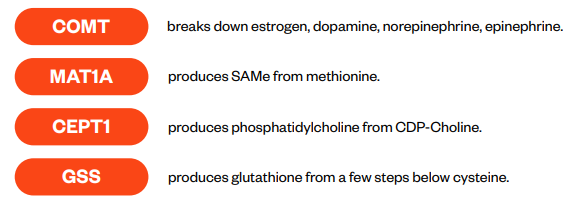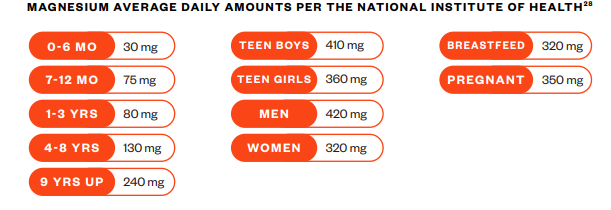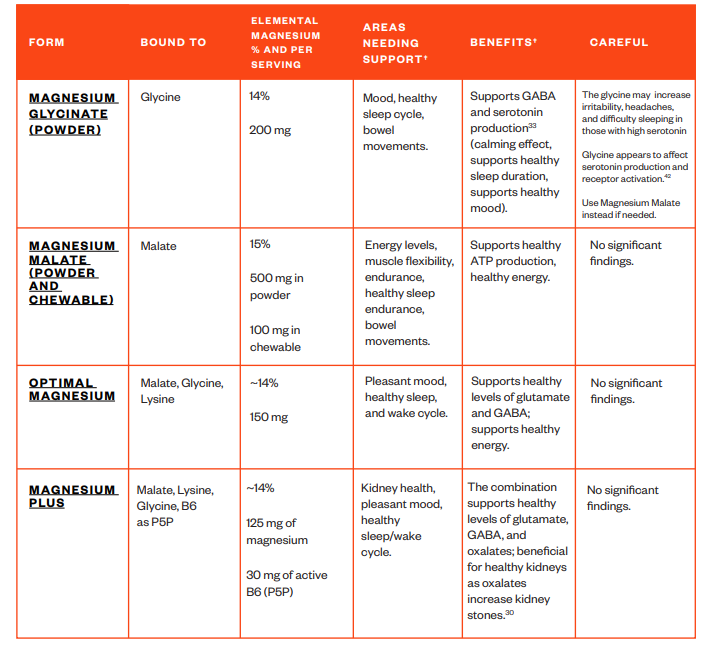How to use Magnesium GuideUpdated 21 days ago

Magnesium supports the following areas of health: †
| • Heart1 | • DNA stability and longevity11,12 |
| • Energy2,3 | • Thyroid13,14 |
| • Muscles2 | • Parathyroid15 |
| • Brain, nerves, and cognition4,5,6 | • Sleep quality16 |
| • Blood pressure7 | • Mental health17,18 |
| • Immune system8 | • Hormone receptor binding34 |
| • Blood glucose9 | • Protein synthesis34 |
| • Bones10 | • Uterus and ovaries, including PMS |
| • Menopausal symptoms19 |
Why does magnesium support these areas of health?†
• Magnesium actively transports calcium and potassium across cell membranes, which is essential for a healthy heart, brain, muscles, and nerves.2
• It’s necessary for the structural function of proteins, bones, DNA, and mitochondria.21, 3
• It supports the healthy binding of vitamin D to vitamin D receptors and supports vitamin D absorption, transport, and activation.22 This is essential for healthy immune function, blood glucose, and nearly every biochemical reaction in your body as every cell has a need for vitamin D.
• It’s the cofactor for over 600 enzymes supporting nearly 80% of all known metabolic functions.20 These 600 plus enzymes in your body need magnesium to function and their function is essential.
• The binding of magnesium to ATP activates ATP (Mg-ATP).34 When magnesium binds to ATP, the ATP releases its stored energy. ATP is your sole source of energy, essential to keep your body functioning.
• About 3,571 human proteins bind to magnesium.34 Imagine if over 3,571 employees failed to show up to work? That’s what happens if you’re magnesium deficient.
• Magnesium supplementation supports resistance to vitamin D treatment.23
What are the benefits of magnesium?†
• Helps maintain healthy blood pressure.38
• Helps maintain healthy bone strength and mineral density.38
• Helps support a healthy heart rhythm.37
• Supports healthy blood flow in people with migraines.37
• Aids in healthy muscle relaxation and supports healthy muscle flexibility.37
• Supports healthy insulin levels and insulin sensitivity.38
• Supports healthy onset and duration of sleep.37
• Supports a healthy mood.37
• Since it supports healthy insulin levels, it also supports healthy weight.37
Which commonly known genes use Magnesium as a cofactor?
 Foods that contain magnesium:24
Foods that contain magnesium:24
• Spinach - 157 mg, 37% DV per cup cooked
• Squash seeds - 156 mg, 37% DV per 1 oz
• Pumpkin seeds - 156 mg, 37% DV per 1 oz
• Tuna - 109 mg, 26% DV per 6 oz fillet
• Almonds - 77 mg, 18% DV per 1 oz
• Dark chocolate - 65 mg, 15% DV per 1 oz
• Avocados - 58 mg, 14% DV per avocado
What increases the loss of magnesium?2
| • Diuretics | • Mental stress (high cortisol)36 |
| • Antacids (omeprazole, proton pump inhibitors) | • Low protein diet |
| • Alcohol | • Foods containing phytates and oxalates (rice, nuts) |
| • Low stomach acid | • Caffeine |
| • Inflammatory bowel disease (celiac, Crohn’s, ulcerative colitis) | • Antidepressants |
| • H. pylori | • Insulin and insulin mimetics |
| • Age | • Antibiotics |
| • Postmenopause | • Antimicrobials |
| • The content of magnesium in fruits and vegetables has dropped by 90% in the last decade26 | • Chemotherapy |
| • Cooking vegetables increases loss by 80% | • Digoxin |
| • Bleaching grains increases loss by 80% | • Beta-adrenergic agonist |
| • Soft drinks | • Immunosuppressants |
How much magnesium is stored in the body, and where is it located?
• 25 grams of magnesium is in reserve in an average 150-pound person. That’s 25,000 mg!
• 53% stored in bone
• 27% stored in muscle
• 19% stored in soft tissues
• 1% in the serum
• Highly concentrated in mitochondria inside your cells35
How long does magnesium last in your body?
• The biological half-life of magnesium is 42 days.34 This is how long it takes for 50% of your magnesium to leave the body.
• If not replacing magnesium with food or supplements, one would be likely deficient in magnesium within 80 days (or 2.5 months).
Magnesium deficiency really hurts bones.27
• In an attempt to restore healthy magnesium levels, magnesium will come out of bone and into the blood.
• Magnesium deficiency increases the risk of osteopenia which progresses to osteoporosis.
• Magnesium comes from the mother's bones during pregnancy and breastfeeding.
Which lab tests should be used to measure magnesium?26
• IRBC magnesium testing is very good.
• Serum magnesium is not helpful. You can be pulling magnesium from your own bones to maintain serum magnesium levels. You need to catch magnesium deficiency earlier.
• Serum magnesium levels are tightly regulated by the body, so if one is deficient, it’s not noticed unless one is very, very low in magnesium.
How to take magnesium:
• Magnesium should be taken with a meal as it is a mineral.
• It can be taken on an empty stomach if one has healthy stomach acid and uses magnesium powder, chewables, or capsules.
• Do not take magnesium tablets as they are more difficult to absorb, especially with low stomach acid.
When should magnesium be taken?†
• Taking before bed supports a healthy onset and duration of sleep, especially if combined with vitamin B6.
• Taken before exercise, magnesium supports healthy muscle performance and contraction.
• If you need to supplement a lot with magnesium, it's best to take some in the morning, afternoon, and evening. This way, you can absorb it well and not experience digestive upset or loose stools
How long does it take to restore healthy magnesium levels?29
• Oral magnesium supplementation takes a minimum of 6 weeks.
How much magnesium should I take each day?
• It depends on your activity level, your diet, your age, and which medications you are taking.
• The minimum amount one should get of magnesium is the average daily values below (note that these amounts below are the ‘elemental amounts’):
 What does ‘elemental amount’ mean?
What does ‘elemental amount’ mean?
• Elemental amount is the actual amount of the nutrient you’re trying to consume.
• Many supplement companies advertise ‘Magnesium Threonate 2000 mg’ on the front of their bottles.
• That means there are 2,000 mg of magnesium threonate in total.
• The amount of actual magnesium, the element of magnesium, is only 144 mg in the 2,000 mg of magnesium threonate.
Signs of excessive use of magnesium:
• Loose stools are a sign of either excess magnesium or poor absorption.
• Muscle weakness (associated with taking magnesium with kidney disease).32
• Heart rhythm irregularities (associated with taking magnesium for kidney disease).32
How to counter the side effects of magnesium:
• Stop taking it if you are experiencing excess symptoms.
• Measure RBC magnesium to confirm. If just experiencing loose stools and low magnesium, take magnesium with food.
• Make sure you are using magnesium supplements as a capsule, powder, or chewable.
• Do not use magnesium tablets unless they are specially designed for long-term release.
• Do not use magnesium oxide, as it’s the worst absorption.
• Reduce the amount you’re taking at once.
• Take less amounts per dose but take a few times a day.
• Sipping kombucha, apple cider vinegar, or lemon juice increases stomach acid.
When should you be careful with magnesium?
• In advanced-stage kidney disease, the kidneys cannot regulate levels well, so this may lead to high magnesium levels.31
What are the differences between magnesium supplements?
 How to get your daily magnesium levels through supplementation:
How to get your daily magnesium levels through supplementation:
• Men need 420 mg and women need 320 mg of magnesium daily
• Wake up and drink 1 serving of Optimal Electrolyte (125 mg)
• When exercising, in sauna or on the go in your water bottle, drink another serving of Optimal Electrolyte (125 mg)
• Before bed, take 1 capsule of Magnesium Plus or Optimal Magnesium to support healthy sleep (125 mg to 150 mg)
Dr. Lynch’s Guidance
Supporting healthy magnesium levels is best achieved by sipping Optimal Electrolyte. This way you’re supporting a comprehensive approach for magnesium absorption, transport and getting it inside your cell where it belongs. The added taurine, ATP and potassium really support healthy magnesium levels. By adding in 1 capsule of Vitamin D3 + K2 after dinner, you’re further supporting magnesium and vitamin D activation.


What are other ways to support healthy magnesium levels?†
Topical magnesium oils and sprays may be supportive. They don’t appear to be as effective as oral magnesium supplementation. However, topical magnesium may be best if one has poor absorption abilities.40 Epsom salt float tanks seem to support healthy muscles in those who have tight muscles. There is limited research on this. The float tanks use about 800 to 1000 pounds of Epsom salt, which is magnesium sulfate. Since magnesium sulfate provides 20% elemental magnesium, this means there are about 200 pounds of magnesium in the bath water! Dr. Lynch highly recommends trying the float tanks.41
Always consult with a healthcare professional before starting any new supplement, especially at higher doses.

1. https://pubmed.ncbi.nlm.nih.gov/20353903/
2. https://pmc.ncbi.nlm.nih.gov/articles/PMC4455825/
3. https://pmc.ncbi.nlm.nih.gov/articles/PMC4217410/
4. https://pmc.ncbi.nlm.nih.gov/articles/PMC11461281/
5. https://pmc.ncbi.nlm.nih.gov/articles/PMC7468697/
6. https://pubmed.ncbi.nlm.nih.gov/20152124/
7. https://pmc.ncbi.nlm.nih.gov/articles/PMC7827637/
8. https://pmc.ncbi.nlm.nih.gov/articles/PMC10961779/
9. https://pubmed.ncbi.nlm.nih.gov/27329332/
10. https://pubmed.ncbi.nlm.nih.gov/33959846/
11. https://pmc.ncbi.nlm.nih.gov/articles/PMC10892939/
12. https://pubmed.ncbi.nlm.nih.gov/11295157/
13. https://pmc.ncbi.nlm.nih.gov/articles/PMC6028657/
14. https://pubmed.ncbi.nlm.nih.gov/17984925/
15. https://pubmed.ncbi.nlm.nih.gov/12105390/
16. https://pmc.ncbi.nlm.nih.gov/articles/PMC8996025/
17. https://pmc.ncbi.nlm.nih.gov/articles/PMC5487054/
18. https://pubmed.ncbi.nlm.nih.gov/33260549/
19. https://pubmed.ncbi.nlm.nih.gov/28392498/
20. https://pmc.ncbi.nlm.nih.gov/articles/PMC10385004/
21. https://pubmed.ncbi.nlm.nih.gov/2472534/
22. https://pubmed.ncbi.nlm.nih.gov/29480918/
23. https://pubmed.ncbi.nlm.nih.gov/28471760/
24. https://www.myfooddata.com/articles/foods-high-in-magnesium.php
25. https://www.fda.gov/drugs/drug-safety-and-availability/fda-drug-safety-communication- low-magnesium-levels-can-be-associated-long-term-use-proton-pump
26 https://pmc.ncbi.nlm.nih.gov/articles/PMC6163803/
27. https://pmc.ncbi.nlm.nih.gov/articles/PMC6008960
28. https://ods.od.nih.gov/factsheets/Magnesium-Consumer/
29. https://pubmed.ncbi.nlm.nih.gov/1814318/
30. https://www.peacehealth.org/medical-topics/id/hn-1228000?t
31. https://link.springer.com/article/10.1007/s10157-022-02182-4?t
32. https://karger.com/bpu/article/45/1-3/173/329522/Magnesium-in-Chronic-Kidney-Disease -Should-We-Care?t
33. https://www.ncbi.nlm.nih.gov/books/NBK507250/?
34. https://onlinelibrary.wiley.com/doi/10.1155/2017/4179326?t=
35. https://www.sciencedirect.com/science/article/pii/S0167488904002630
36. https://www.mdpi.com/2072-6643/12/12/3672?t
37. https://www.webmd.com/diet/supplement-guide-magnesium?t
38. https://ods.od.nih.gov/factsheets/Magnesium-Consumer/?t
39. https://www.degruyter.com/document/doi/10.7556/jaoa.2018.037/html?lang=en&t
40. https://www.sciencedirect.com/science/article/pii/S2950456224000186
41. https://www.i-sopod.com/i-sopod/what-is-a-floatation-tank
42. https://www.psychologytoday.com/us/blog/sleep-newzzz/201902/4-sleep-benefits-of-glycine?t
†These statements have not been evaluated by the Food and Drug Administration. This product is not intended to diagnose, treat, cure, or prevent any disease.